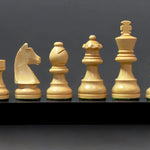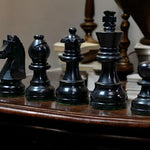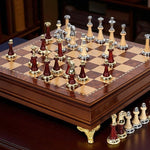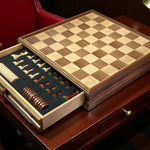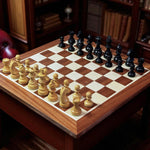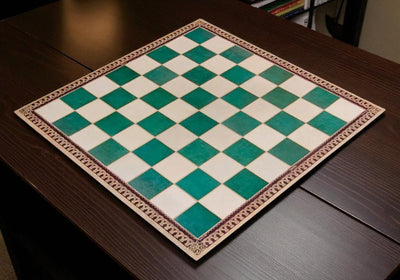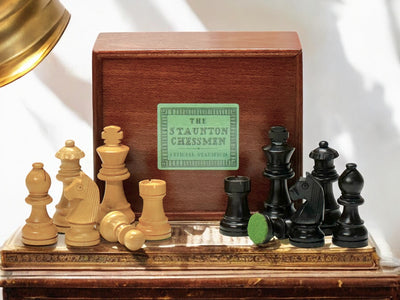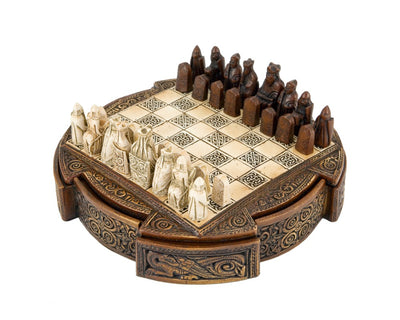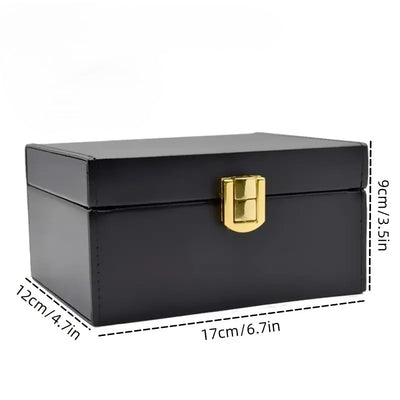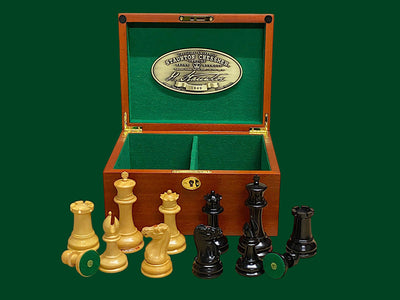How to choose the right Chess Board | A Quick Help Guide
How Do I Choose the Best Chess Board for Me?
Choosing a chess board can feel a bit like picking out a car – it’s all about personal taste, functionality, and style. Whether you’re a budding player or a seasoned grandmaster, your chess board can shape your playing experience in more ways than you might realise. Here's a user-friendly guide that will help you choose the right one for you.
1. Know Your Purpose: Display or Play?
The first question to ask yourself is: why do I want this chess board? If it’s going to sit proudly on a mantelpiece, you might want a grand, decorative board that showcases craftsmanship. On the other hand, if you’re planning on using it for regular games, practicality and durability will matter more. The best chess board is one that fits its purpose perfectly.
2. What’s Your Budget?
Chess boards can range from the incredibly affordable to the jaw-droppingly expensive. It’s worth considering how much you're willing to invest. You can find basic yet functional boards for less than £30, or you can splurge on luxury sets made from exotic woods or marble. A higher price often reflects the material and craftsmanship, but even budget boards can offer a satisfying playing experience.
3. Material: Wood, Plastic, or Something Else?
Wooden chess boards have a classic appeal. Woods like walnut, mahogany, and maple not only look beautiful but also offer a satisfying, solid feel. Plastic boards, on the other hand, are lightweight and often easier to transport – great for chess clubs or travelling players. If you're looking for something unique, there are marble, glass, and metal boards, each offering their own distinctive style and tactile experience.
Remember, if you're planning to use the board for actual play, consider how the pieces will interact with the surface. Slippery glass may not give you the same confident move as wood or plastic.
4. Size Does Matter
Chess boards come in different sizes, but the most common is the standard tournament size (with a square size of 2.25 inches). However, if you're limited on space or plan to travel with your board, you might prefer a smaller set. Make sure that the size of the board matches the size of your pieces – oversized or undersized pieces can make playing awkward and frustrating.
Pro tip: the king’s base should be about 75% of the size of each square for the perfect balance.
5. Design and Aesthetic: Classic or Contemporary?
The beauty of chess lies in its timelessness. Some prefer a traditional Staunton set with a simple, elegant board, while others may seek something a bit more avant-garde. Think about where you’ll place the board and what style will complement your surroundings. Do you want a piece that blends in or stands out? There’s no right or wrong answer here – just go with what speaks to you.
6. Portability: Do You Need to Take It on the Go?
If you're someone who loves playing at different locations – perhaps you’re part of a local chess club, or you love setting up games in the park – portability is key. Folding boards or roll-up vinyl boards are lightweight and easy to carry. Some even come with built-in storage for your pieces, making life simpler for the mobile player.
7. Think Long-Term: Quality and Durability
A well-made chess board can last a lifetime (or even be passed down through generations). If you plan to keep the board for years to come, consider investing in quality. Handcrafted boards from durable materials like hardwood or marble tend to age beautifully, gaining character over time.
8. The Feel: Texture Matters
When playing, you’ll spend a lot of time moving your hands across the board, so think about the texture. A smooth, polished wood can feel luxurious, while a rougher texture might be less satisfying during play. If possible, visit a store where you can touch and feel different boards. The sensory experience can be just as important as the visual appeal.
9. Storage Considerations
Where will you keep your chess board? Some sets come with built-in drawers for pieces, while others may require separate storage. If space is limited, a board that folds or rolls up might be more practical. Think about how often you’ll use the board and where it will fit into your home.
10. Sustainability: Does it Matter to You?
If you're eco-conscious, look for chess boards made from sustainably sourced wood or eco-friendly materials. Some manufacturers specialise in creating high-quality boards without compromising on environmental impact. This is an important factor for many buyers today, especially as we move towards greener living.
Follow Your Instincts
Choosing the best chess board comes down to a combination of personal preference, practicality, and your own playing habits. If you’re serious about chess, consider investing in a quality set that matches your personality. If it’s just for casual play, then a simple, functional board might be all you need. Trust your instincts and choose a board that excites you every time you sit down to play.



